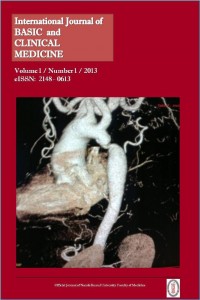Öz
Aim This study aims to compare depressive symptoms and perceived familial support levels between mothers having physically and mentally handicapped children and mothers not having physically and mentally handicapped educable children. Materials and Methods The study included 80 volunteer mothers having mentally and/or physically disabled educable children (n=40) and mothers not having disabled children (n=40). This is a case-control study. Our assessment measurements were General Information Form, Beck Depression Inventory (BDI) and Perceived Social Support Taken From Family (PSSF). Results In both groups marriage relations and BDI-PSSF scores were compared. It is ascertained that mothers having disabled children the marriage satisfaction is low (p<0.001). BDE score of the women having disabled children is 24.7±9.8, and the women having healthy child is 18.8±10.2; PSSF score of the women having disabled child is 28.0±7.9 and the women having healthy child is 20.6±9.0. The significant difference has been found between the groups (p<0.001). Conclusion It has been concluded that the mothers with a disabled child have problems with their family and husband relations, the perceived social support is lower and they have higher depression scores. Mothers with a mentally and/or physically disabled child are more in need of psychosocial support. Disabled children and their families being in the first place, primary health care services and integrated psychosocial support programs must be commenced as a health improvement approach
Anahtar Kelimeler
Kaynakça
- WHO & WB.
Eğitilebilir Zihinsel, Bedensel Engelli Çocuğa Sahip Olan ve Olmayan Annelerin Aileden Algıladıkları Sosyal Destek İle Depresyon Düzeylerinin Karşılaştırılması
Öz
Amaç
Eğitilebilir zihinsel engelli çocuğu olan annelerin aileden
algıladıkları sosyal destek ve depresif belirti düzeyini
zihinsel engelli çocuğa sahip olmayan annelerle
karşılaştırmaktır.
Materyal ve Metod
Çalışma, eğitilebilir zihinsel ve/veya bedensel engelli
(n=40) ve herhangi bir fiziksel ya da zihinsel yetersizliği
olmayan (n=40) çocuk anneleri üzerinde yapıldı. Olgu-kontrol
çalışmasıdır. Veri toplama aracı olarak Genel Bilgi
Formu, Beck Depresyon Envanteri (BDE) ve Aileden
Algılanan Sosyal Destek Ölçeği (ASDÖ) kullanıldı.
Bulgular
Engelli çocuğa sahip olan(olgu) ve olmayan(kontrol)
gruplarda annelerin evlilik ilişkileri, BDE ve ASDÖ skorları
karşılaştırıldı. Engelli çocuğu olan kadınlarda evlilikten
memnuniyetin düşük olduğu belirlendi (p < 0,001). Engelli ve
sağlam çocuğu olan kadınlarda BDE skoru ortalamaları
sırasıyla 24,7±9,8 ve 18,8±10,2; ASDÖ skoru ortalamaları
ise sırasıyla 20,6±9,0 ve 28,0±7,9 olarak hesaplandı.
Gruplar arası anlamlı fark bulundu (p < 0,001).
Sonuç
Engelli çocuğa sahip annelerin aile ve eş ilişkilerinde daha
çok sorun hissettikleri, aileden algıladıkları sosyal desteğin
daha düşük olduğu, daha yüksek depresyon skorlarına
sahip oldukları bulunmuştur. Zihinsel ve/veya bedensel
engelli çocuğa sahip anneler psikososyal desteğe daha
fazla ihtiyaç duymaktadırlar. Sağlığın geliştirilmesi
yaklaşımı kapsamında başta engelli çocuklar ve aileleri
olmak üzere tüm çocuklu aileleri kapsayacak birinci
basamak sağlık hizmetleri ile entegre psikososyal destek
programları başlatılmalıdır.
Anahtar Kelimeler
Kaynakça
- WHO & WB.
Ayrıntılar
| Birincil Dil | Türkçe |
|---|---|
| Bölüm | Araştırma Makaleleri |
| Yazarlar | |
| Yayımlanma Tarihi | 25 Mart 2015 |
| Yayımlandığı Sayı | Yıl 2013 Cilt: 1 Sayı: 1 |


